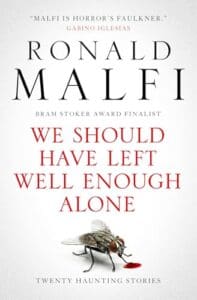
Synopsis:
Clio Louise Barnes leads a picture-perfect life as a stylist and influencer, but beneath the glossy veneer she harbors a not-so glamorous secret: she grew up in a haunted house. Well, not haunted. Possessed. After Clio’s parents’ messy divorce, her mother, Alex, moved Clio and her sisters into a house occupied by a demon. Or so Alex claimed. That’s not what Clio’s sisters remember or what the courts determined when they stripped her of custody after she went off the deep end. But Alex was insistent; she even wrote a book about her experience in the house.
After Alex’s sudden death, the supposedly possessed house passes to Clio and her sisters. Where her sisters see childhood trauma, Clio sees an opportunity for house flipping content. Only, as the home makeover process begins, Clio discovers there might be some truth to her mother’s claims. As memories resurface and Clio finally reads her mother’s book, a sinister presence in the house manifests, revealing ugly truths that threaten to shake Clio’s beautiful life to its very foundation.
Review:
Decadently nasty, as mean as gossip, a little glamorous, and an outrageously good time, let me tell you that Harrison’s latest is her sharpest, scariest yet, and is best enjoyed on the beach with a strong cocktail- I speak from experience. The plot of “A Head Full of Ghosts,” meets the format of “The Pallbearer’s Club,” meets tabloids, NYC and DIY in “Play Nice,” in which Harrison confronts the media, its crucifixion of women in particular, amongst perception and trauma… by way of a demon. Poltergeists have nothing on paparazzi. Harrison has long been Kelly-Clarkson-ing horror tropes, vampires with “So Thirsty,” werewolves with “Such Sharp Teeth,” and here, the haunted house receives the same treatment. Assuming you’ve read Harrison before, it’s as good as you think it is. Horror is hot, it’s in, and “Play Nice,” is a must-read this season- it’s a book within a book, so it’s 2 for the price of 1… and it’s out September 9th from Titan in the UK, and Berkley in the US.
We follow Clio, an influencer in the fashion industry with a beautiful life, but a decidedly less beautiful childhood. She is mostly too young to remember what happened to her and her sisters Lena and Daphne at 6 Edgewood Drive, but the horrors that exist, fragmented on the very periphery of her awareness come sharply into focus when her mother, Alexandra dies. She was a character, too eccentric, too volatile, for most of the family to acknowledge post an incredibly messy divorce and the loss of split custody, but Clio is more open-minded. Not only is she the only one on her dad’s side who attends the funeral, but she’s also the first to volunteer to deal with the house, envisioning a viral house-flipping project. It’s during her time there that she also becomes the first to read her late mother’s memoir- “The Demon of Edgewood Drive.”
Clio is a highly compelling protagonist who commands the page from the get-go. She is self-assured and witty, magnetic and complicated- her relationships, both strained familial dramas and tentative romantic ones feel incredibly real. She is sometimes irritating, a little reckless, still semi-dependent upon her dad. She’s not always likeable, but she consistently makes for a wonderful main character. Harrison’s protagonists for me have always been the beating heart of her stories, and, despite her flaws, it’s safe to say that Clio has joined the ranks of Sloane, Vesper and Rory as remarkable women whom Rachel has created. It’s through Clio, Harrison explores perception, memory and repression born from grief, trauma and the narratives imposed by others. It truly makes her more compelling still that her determination, wit and confidence do not buckle in the face of loss or distortion.
She is the strong female lead that the story demands, a lens through which Harrison is able to confront public gaze, tabloid culture, the gossip machine. The idea of the demon is one used as a metaphor for the media throughout. It’s a powerful beast, the media, one that can create and dismantle careers, one that drags, shames, cancels. It’s fickle, exploitative, relentless. Ask Britney Spears, Lindsey Lohan, Janet Jackson- it goes on. A parallel drawn by Harrison specifically would be intention. Why is it they put these women through the cultural shredder? Humiliate them publicly? Tinker with reality in a way that makes for a salacious headline or an interesting post and relinquish them to “the person who did that thing?” Well, because they can, and because we’ll watch. Just like the demon central to “Play Nice,” the main motivation for churning out these “bubblegum misogyny,” gossip pieces, secondary to perhaps money, is because it’s what the people want. Another parallel drawn is, fittingly, neither the gossip machine nor the demonic entity “play nice.” Not really. It’s a literal interpretation of the term “demonisation,” and makes room for plenty of rage. It applies most directly to Alexandra, who is portrayed through a misogyny-loaded lens as batty, hysterical, a crazy woman, (all of those weaponising terms) but also to Clio whose friendships seem fragile, centered around brand deals and party invites- which as established, are a mis-step or headline away from being ripped away.
Amityville, except it’s New York, Rachel Harrison’s “Play Nice,” is my favourite of her works to date. Fast-paced, gleefully entertaining and yet gorgeously written and sharply observant, it’s near impossible not to be swept up in its momentum- Tananarive Due calls it irresistible and I’m inclined to agree. A biting, thrilling testament to Harrison’s work in contemporary horror, and a reminder of just how lucky today’s horror readers are to have her, “Play Nice,” is a riot.









Leave a Reply